Bollywood Movies with Some Really Toxic Male Protagonists
8 minuteRead

Time and again, we have questioned the much-debated aspect of Bollywood culture - the portrayal of toxic masculinity. In the 70s, the male characters on screen were supposedly macho, and all the females inevitably would get reduced to damsels in distress. Then in the 90s, movies like Biwi No. 1 gave us characters like Prem Mehra, who, despite being the one cheating on his wife, escapes the entire load of the blame and instead, shares it with the extra-marital girlfriend. The list goes on and on, in which movies hero men who cross borders to save the lives of their heroines, and the women just played the parts of a devoted partner or a loyal daughter.
Masculinity in Bollywood Since The Beginning
During the era of the “Angry Young Man,’ the foundation of what a man should be was somewhat laid in stone. Right until the 90s, this trope found a special place in not only the minds of the viewers but also the directors, who continued to dish out movies with strong, “masculine” heroes. Actors like Amitabh Bacchan would fight off villains on screen and become the pillar of support for the women in their lives.
Another actor who became famous around the same time for his aggression on-screen was Dharmendra. Heroes were made to play the roles of sons and fathers, yet the focus was on presenting themselves as macho as they possibly could, with dialogues that reiterated the same ideas. This era propagated the ideal male character who was tough as nails, rowdy, and “extremely masculine”. Sholay was a movie that portrayed its female character as the woman who needs rescuing, and most of the famous dialogues from the movie were the heroes’ threatening lines told to villains.
Towards the end of the 20th century, actors like Govinda and Akshay Kumar stepped up and began to take the roles of slightly comedic characters within similar storylines. But, pressing issues like extramarital affairs were often portrayed as punchlines during this period. For example, in the movie Biwi Number One, Salman Khan plays the character of a man who cheats on his wife. The movie reinforces ideas of internalized misogyny among women by conveniently placing the blame on the girlfriend, instead of the husband.
Around the same time, directors like Sooraj Barjayta created films that were supposedly “family-friendly”, such as Hum Saath Saath Hai and Hum Apke Hain Kaun. The problem with films like these was that they dictated gender roles, hiding behind the excuse of portraying a “family”, where women are only given the roles of homemakers, whose only duties revolved around the hero. They had virtually little to no agency. If the movie had different themes from the usual drama-action-violence trope, they fell under the obsolete comedy category, where more often than not, gendered remarks and sexist cracks provided comedic relief.
Unfortunately, this aspect of toxic masculinity still continues to penetrate 21st century Bollywood cinema and we feel that it is high time this trend is eradicated, for good. To begin with, let us recognize and talk about some Bollywood films that have glorified toxic male characters in the recent past.
1. Kabir From Kabir Singh
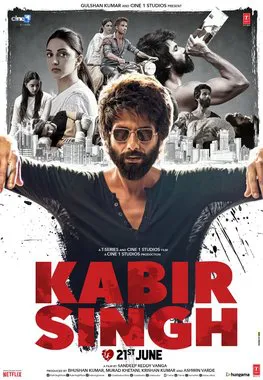
Source: Wikipedia
Just as this movie got accolades for its male lead’s (Shahid Kapoor) incredible acting prowess, it started the conversation regarding the portrayal of a romanticized version of toxic masculinity. The rugged, handsome and super alpha male Kabir, who will beat up anyone who stands in the way of his lover, the submissive and sweet Preeti, is definitely a questionable character. We can nitpick and criticise many different aspects of the movie, but some that stand out include the fact that Preeti has barely any dialogue in the film. Additionally, she isn’t even allowed to pick out her own friends, Kabir does that for her. It is quite unfortunate that a movie with such a portrayal of masculinity has gained so much applause in the industry.
2. Chulbul Pandey From Dabangg
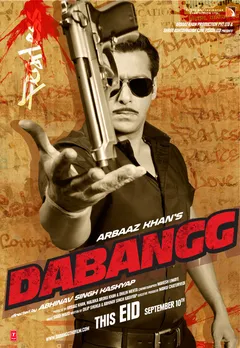
Source: Wikipedia
The problem begins when famous actors like Salman Khan readily take up roles like these. One might argue that Chulbul’s character and ideologies seemed to serve the purpose of comic relief, but at the end of the day, it raises many questions in the viewers’ minds. Rajjo, the female lead, is devastated due to her father’s death - and lo and behold! Not only does Chulbul gatecrash the funeral, but he also decides that it is a good idea to tell people to not grieve as Rajjo gets to celebrate her new life with him. Hold on a second - how does that make any sense? The item number in the movie, Munni Badnam Hui Darling Tere Liye, itself goes on to speak volumes.
3. Bunny From Yeh Jawaani Hai Deewani
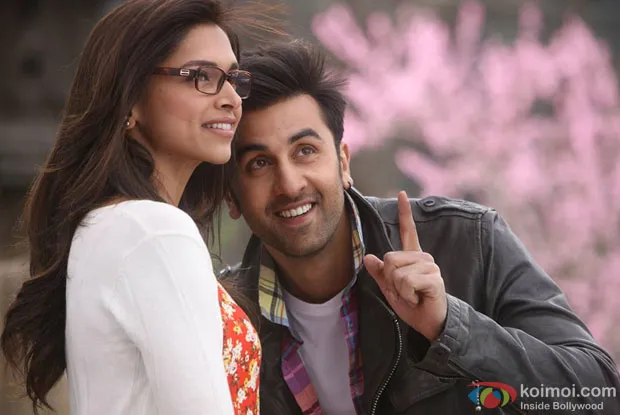
Source: koimoi
The sad reality is that there are several men who want to be like Bunny and even more women who wish to live a life Bunny style. Except, his character is severely problematic and accepting this as it is is just not the way to go forward. Bunny, after deciding he wants to live his life to the fullest, comes back and realises that he loves Naina. Everything that he did was acceptable right up until this moment - what doesn’t work is his crazy spree trying to claim Naina as hers when he himself isn’t sure of the commitment. There is also one scene where Bunny decides, just because he is jealous, that it is okay to shun another male character without even stopping to think about seeking Naina’s approval.
4. Sonu From Sonu Ke Titu Ki Sweety
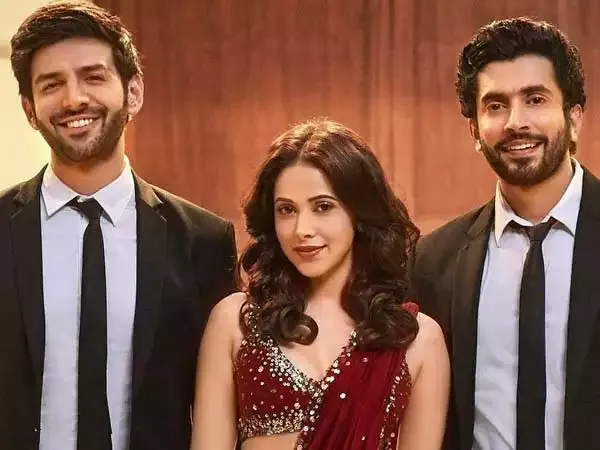
Source: Filmfare
It is very well understood that Luv Ranjan tries to portray the emotions that men feel, but it makes a critic uncomfortable while juggling with the fact that this inevitable paints the picture of a man who has multiple problems with the opposite gender. In the film, Sonu advises Titu to have post-break-up sex with his new girlfriend instead of trying to resolve his issues. The spectacle doesn’t end here. Sonu even provides a character certificate for Sweety and tries his hand at every possible way to manipulate Titu into leaving Sweety. Are men only able to identify women as gold-diggers? Now that’s definitely some food for thought.
5. Rahul From Kuch Kuch Hota Hai
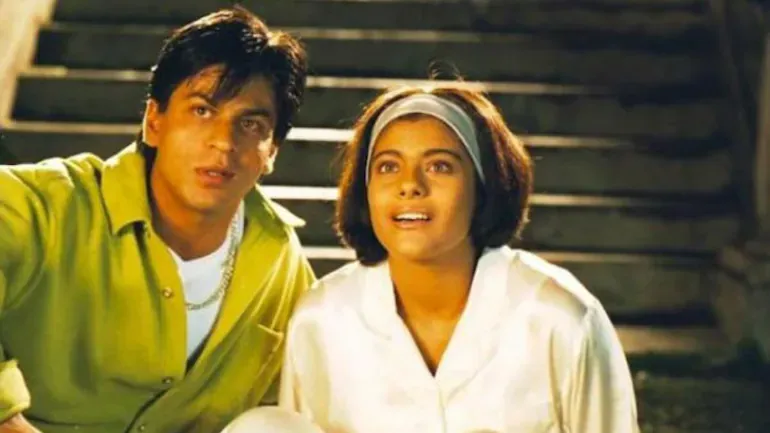
Source: indiatoday
Most of you will probably be wondering why Rahul made the cut. Well, he is also most definitely one of the most poignant examples of toxic masculinity. From falling in love with the same woman after she presents herself in a more “feminine” way, to saying things like “basketball isn’t for women”, Rahul is nowhere close to the ideal of a perfect man. Still, we continue idolizing his character and decide that this should be the prescribed characteristics of a man.
There are so many more examples of Bollywood movies that have glorified stalking to a point where the youth and newer generations believe that to get your girl, this procedure is the norm. Movies like Rehnaa Hai Terre Dil Mein showcase protagonists who stalk the girl they’re in love with and even goes on to impersonate the man who her parents have chosen for her, just so that he can come closer to her!
Obviously, all of us who are hardcore desi music fans love to groove to tunes like ‘Daru Desi’ and ‘Tum Hi Ho Bandhu’ from the movie Cocktail. But, do any of us take the time out to consider how the male lead in this movie was literally that toxic player boy who our friends keep warning us to stay away from? Gautam loved to party and only wanted to have fun, and dated Veronica due to the fact that she was “uncomplicated”. She was a “modern girl” whose ideologies were similar to his, and obviously, that was all that mattered. Right? No, wrong! He ultimately falls for the typical girl next door with ‘sanskari' values, just as the stereotypical misogynistic male character would. We literally can’t stop shaking our heads.
Not So Angry Men: Emergence of New Ideal Man in Bollywood
Somewhere along the lines, the notion of toxic masculinities has also been challenged, especially of late. Mere Brother Ki Dulhan, Jaane Tu Ya Jaane Na, Hindi Medium, Tumhari Sulu are all movies that heroes men who were unabashed and unthreatened by the presence of strong female characters around them. Instead, they were supportive, contributed a lot more to housework and were also highly expressive about their emotions. None of this should in any way, ever, go against what a “man” stands for.
Irfan Khan played the role of a caring father as well as a loving husband in the movie Hindi Medium. He respects the importance of good education for his daughter and also understands the struggles of his wife.
In the Tanu Weds Manu series, Madhavan is a shining example of how men can express themselves without needing to be toxic - he handles rejection in a mature and graceful way. He also understands the concept of consent in both movies.
Vicky Kaushal was a great example of evolved masculine presence on screen in the movie Raazi. He is a caring husband who doesn’t shy away from showing his nervousness in front of his new bride. This goes a long way in humanizing male characters on-screen, who are more often than not taught to only display two kinds of emotions - anger/jealousy and joy.
Supportive Boyfriends and Loving Fathers: Non-Hegemonic Masculinities Off-Screen
Some of the leading heroes on screen these days are receiving accolades for changing some of these rigid norms. Popular actor Shah Rukh Khan has recently come forth and revealed that his character, “Raj” in Dilwale Dulhaniya Le Jayenge was definitely neither a good person nor an ideal role model.
We have been witnessing Ranveer Singh getting praised for dressing up in a manner that spits on the face of binary division when it comes to clothing. Deepika Padukone has also been extremely grateful for the support she received from him during her depression. The MARD campaign (Men Against Rape And Discrimination) started by Farhan Akhtar made some strides in supporting women. However, it helps to note that all this should become normal as soon as possible and in no way should men be commemorated for doing the bare minimum and not veering towards the path of toxic, masculine notions.
Off late, non-hegemonic masculinities can be seen both on-screen and also in real life. Still, there remains a lot to be dealt with. There needs to be room provided for thoughtful representation of not just queer men, but also those who are Dalit-Bahujan-Adivasi, who often don’t get enough screen time in mainstream cinema.
Masculinities, whether hegemonic or non-hegemonic affect everyone. It tells young boys what is expected of them and it tells young girls what to expect. It also tells queer people what is normal and what isn’t. It is somewhere responsible for internalized homophobia among men as they are expected to control everyone and the idea of macho lacks space for homosexual/homoromantic men.
Additionally, it causes an irrational femme phobia among queer men as feminine male characters are publicly discriminated against in public and invariably face prejudice. Toxic masculinity contributes towards acts of brutality against not only queer women but also heterosexual women. This stems from the fact that men somehow continue believing that women are their “responsibility” and it is their “duty” to preserve their “honour”. Popular media platforms like movies that are consumed on a massive scale go on to promote and normalize these notions.
Change is most definitely happening, but these ideas of toxic masculinity continue plaguing Bollywood films and a lot more effort has to be put in order to steer them in the right direction.
Write, Record and Answer! Consume Unlimited Content! All you need to do is sign in and its absolutely free!
Continue with one click!!By signing up, you agree to our Terms and Conditions and Privacy Policy.










